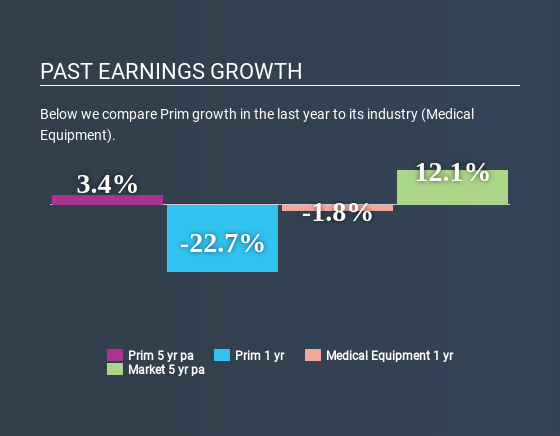- Spain
- /
- Medical Equipment
- /
- BME:PRM
Prim, S.A.'s (BME:PRM) Stock On An Uptrend: Could Fundamentals Be Driving The Momentum?
Prim (BME:PRM) has had a great run on the share market with its stock up by a significant 11% over the last three months. As most would know, fundamentals are what usually guide market price movements over the long-term, so we decided to look at the company's key financial indicators today to determine if they have any role to play in the recent price movement. In this article, we decided to focus on Prim's ROE.
Return on Equity or ROE is a test of how effectively a company is growing its value and managing investors’ money. In other words, it is a profitability ratio which measures the rate of return on the capital provided by the company's shareholders.
See our latest analysis for Prim
How To Calculate Return On Equity?
Return on equity can be calculated by using the formula:
Return on Equity = Net Profit (from continuing operations) ÷ Shareholders' Equity
So, based on the above formula, the ROE for Prim is:
9.5% = €11m ÷ €112m (Based on the trailing twelve months to March 2020).
The 'return' is the income the business earned over the last year. One way to conceptualize this is that for each €1 of shareholders' capital it has, the company made €0.09 in profit.
What Has ROE Got To Do With Earnings Growth?
So far, we've learnt that ROE is a measure of a company's profitability. Depending on how much of these profits the company reinvests or "retains", and how effectively it does so, we are then able to assess a company’s earnings growth potential. Generally speaking, other things being equal, firms with a high return on equity and profit retention, have a higher growth rate than firms that don’t share these attributes.
Prim's Earnings Growth And 9.5% ROE
At first glance, Prim seems to have a decent ROE. Even when compared to the industry average of 9.9% the company's ROE looks quite decent. Despite the modest returns, Prim's five year net income growth was quite low, averaging at only 3.4%. So, there could be some other factors at play that could be impacting the company's growth. For instance, the company pays out a huge portion of its earnings as dividends, or is faced with competitive pressures.
As a next step, we compared Prim's net income growth with the industry and were disappointed to see that the company's growth is lower than the industry average growth of 12% in the same period.

Earnings growth is a huge factor in stock valuation. The investor should try to establish if the expected growth or decline in earnings, whichever the case may be, is priced in. This then helps them determine if the stock is placed for a bright or bleak future. One good indicator of expected earnings growth is the P/E ratio which determines the price the market is willing to pay for a stock based on its earnings prospects. So, you may want to check if Prim is trading on a high P/E or a low P/E, relative to its industry.
Is Prim Using Its Retained Earnings Effectively?
With a high three-year median payout ratio of 71% (or a retention ratio of 29%), most of Prim's profits are being paid to shareholders. This definitely contributes to the low earnings growth seen by the company.
In addition, Prim has been paying dividends over a period of at least ten years suggesting that keeping up dividend payments is way more important to the management even if it comes at the cost of business growth.
Conclusion
Overall, we feel that Prim certainly does have some positive factors to consider. However, while the company does have a high ROE, its earnings growth number is quite disappointing. This can be blamed on the fact that it reinvests only a small portion of its profits and pays out the rest as dividends. While we won't completely dismiss the company, what we would do, is try to ascertain how risky the business is to make a more informed decision around the company. You can see the 2 risks we have identified for Prim by visiting our risks dashboard for free on our platform here.
Love or hate this article? Concerned about the content? Get in touch with us directly. Alternatively, email editorial-team@simplywallst.com.
This article by Simply Wall St is general in nature. It does not constitute a recommendation to buy or sell any stock, and does not take account of your objectives, or your financial situation. We aim to bring you long-term focused analysis driven by fundamental data. Note that our analysis may not factor in the latest price-sensitive company announcements or qualitative material. Simply Wall St has no position in any stocks mentioned. Thank you for reading.
About BME:PRM
Prim
Operates as a health technology, mobility, and health care products provider in Spain.
Flawless balance sheet with solid track record.
Market Insights
Community Narratives




